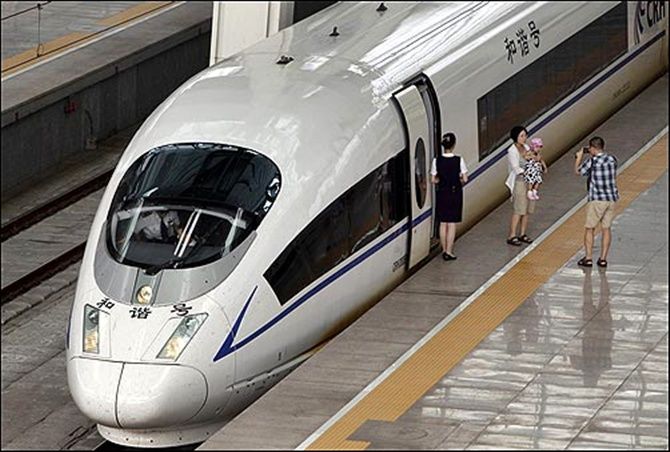Japanese Prime Minister Shinzo Abe's $12-billion loan at an incredibly low interest rate may have trumped China's aim to enter the enormous Indian Railways market, notes A K Bhattacharya.

In one of the shortest visits to New Delhi by any head of government of a foreign country in recent months, Japanese Prime Minister Shinzo Abe has secured a deal that could well have the most long-lasting impact on economic relations between the two countries as also on the Indian economy.
Abe's short stay and the many agreements he signed with his Indian counterpart, Narendra Modi, also showed in ample measure what adequate planning before embarking on a visit can achieve in tangible terms.
Abe's visit is not just about the signing of a memorandum of understanding on a civil nuclear power co-operation deal.
Four other decisions will stand out from among the many agreements signed by Abe and Modi.
These pertain to an official development assistance or ODA of $5 billion, a $12-15 billion loan for building a high-speed railway project, creating a fund of $12 billion to help Japanese companies invest in India, an investment of $5.5 billion in an industrial corridor project to be located between Chennai and Bengaluru.
Japanese funds in the form of ODA for projects in India are not new. For the past many years, Japanese ODA money has helped implement many projects across the country.
But the current ODA agreement seems to focus on three areas - metro rail projects in Ahmedabad and Chennai, roads in the north-east of India and power transmission lines in Odisha.
A portion of the Japanese ODA would also be used for the Chennai-Bengaluru industrial corridor project, which will include setting up of industrial complexes, roads and other infrastructure on this stretch.
It is clear that basic infrastructure projects in India seem to be the focus of these funds.
A unique feature of the understanding reached between Abe and Modi is that Japanese money would be used to create manufacturing facilities in India.
The details of how this will take shape are yet to be worked out. But committing $12 billion of Japanese funds for creating such projects in India would be a big boost to investments in an economy that is desperately looking for a pick-up in its investment rate.
More importantly, it will go a long way in implementing the Indian government's 'Make in India' programme.
Japanese were early investors in India, even before the economy began opening up in 1991.
In spite of that lead over other competing investing nations, Japan somehow lost that race and in many areas of the Indian economy, Japanese investments failed to pave the way for a more widespread and deep market for Japanese products and services.
Indeed, in some areas like entertainment electronics, Japanese companies failed to make any perceptible impact. Only time will tell whether the infusion of $12 billion of investment now will make amends to that situation from the Japanese point of view, but that is clearly the intent of the latest initiative evident from Abe's agreements on Saturday.
The agreement that is likely to have the biggest and most visible impact is the $12 billion loan from Japan to help India build its first high-speed railway project to connect Ahmedabad with Mumbai.
The 500-kilometre-long railway line would be built within a period of seven years, much before the repayment of the loan starts at an incredibly low interest rate of 0.1 per cent over a period of 50 years.
The agreement provides India not just over 80 per cent of the total project cost, but also technical assistance to build domestic capacity to manufacture coaches and tracks before making them operational.
The potential of this project is huge. If it succeeds, there would be demand for more such projects connecting many more major towns or cities and Japan would have secured for itself a long-term market and lead over its rivals in this area.
That would be Japan's first big gain. The second big gain is no less significant for Japan.
During his visit to India last year, Chinese President Xi Jinping had pledged to assist the Indian Railways to modernise its ageing railway system with the introduction of high-speed rail links and upgraded railway stations.
With a $12-billion loan at such a low interest rate and technological assistance, Abe seems to have outdone Xi in securing for Japan the huge market the Indian Railways offers.
This is exactly what China did to Japan by winning the high-speed railway project in Indonesia with the help of cheaper loans and technology.
India has certainly gained, but that gain may not have been realised without recognising the China-Japan rivalry and tacitly exploiting it.












 © 2025
© 2025